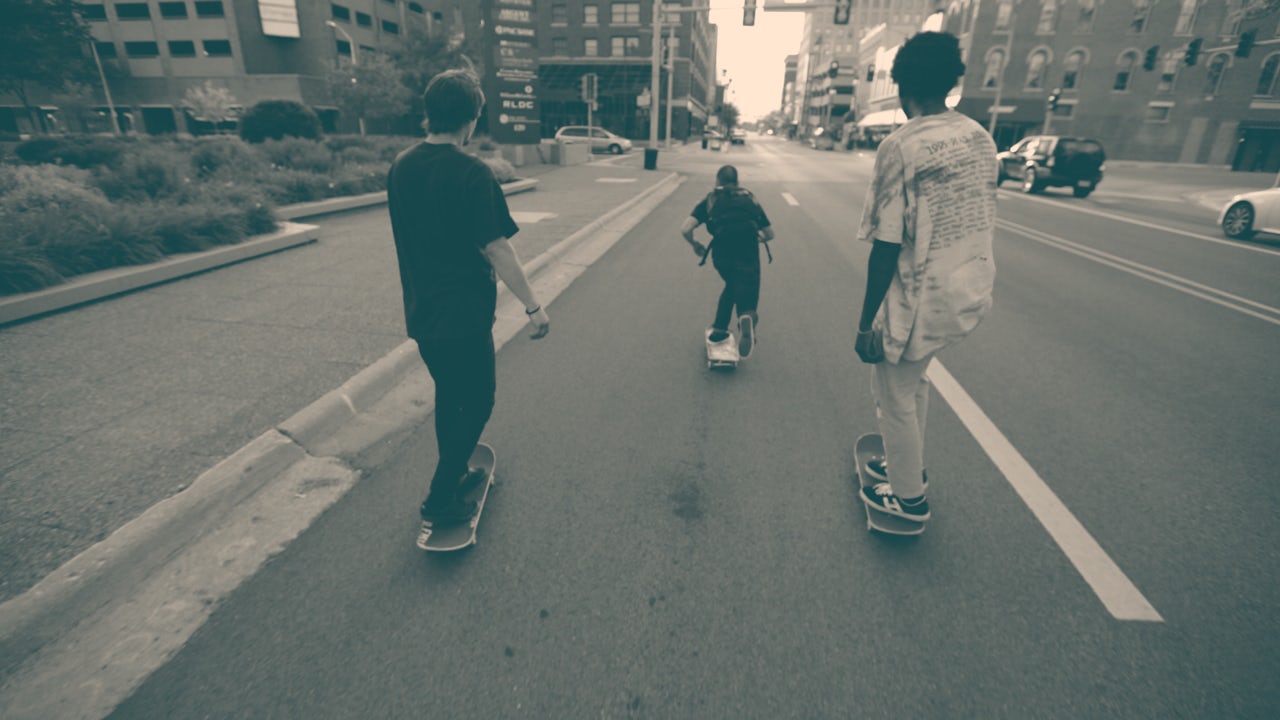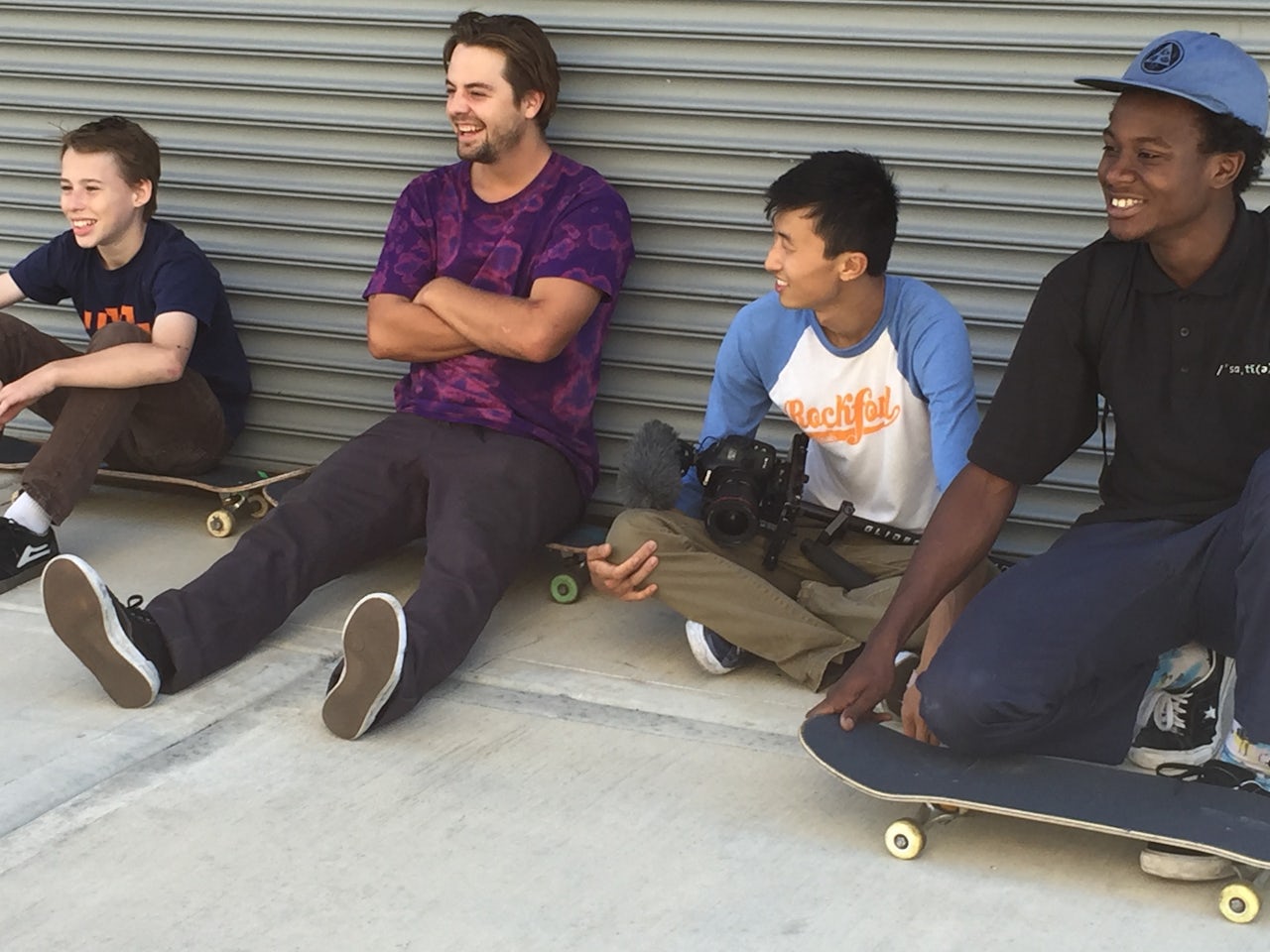The subjects of filmmaker Bing Liu’s new documentary Minding the Gap — coming to theaters and Hulu August 17, and currently showing at the Asian American International Film Festival — are, by most documentary standards, unextraordinary. Zack, Keire, and Liu himself aren’t rich. They aren’t famous. They haven’t been the perpetrators or victims of an unusual crime. Rather they are three friends and skateboarders transitioning from teenhood to adulthood in economically depressed Rockford, IL. And they, like many, are simply learning how to grow up.
Liu is the self-assumed documentarian of the group, having turned his cameras on their friends as they get together and skate around their hometown long before the film’s official start in their late adolescence, early adulthood. That early footage makes its way into Minding the Gap, which we learn early on is Liu’s first major film project. Thanks to his long friendship with Zack and Keire, and the archive of footage he captured during their time together, Minding the Gap has an intimate knowledge of its subjects that documentaries rarely offer. We see them when they are kids, first starting out in skateboarding. We see them older, smoking weed and drinking at parties. We learn Zack has a baby, and a girlfriend he fights with and hits. We learn Keire is struggling with working his first job and seeing his mother date a man he hates. Liu, meanwhile, is making the film, growing from casual skater with a camera to documentarian.
As he films, Liu maintains his role as part of the friend group. “You don’t have to act like I’m not here,” he directs Zack in one scene. He and his friends carry on conversations as he films; he includes footage he has taken of himself, and exposes his family life and childhood struggles, just as he does for his friends. In the process, Liu successfully does away with the anthropological distance that usually separates documentarian and subject. As a result, we see his friends at their most comfortable and his interactions with them at their most delicate. “It’s almost like free fucking therapy,” Keire says when Liu asks him about the experience of being in the film. “I’m making this film because i was physically disciplined by my stepfather and it didn’t make sense to me. And I saw myself in your own story,” Liu replies.
Those words — that confirmation that Liu was truly seeing him — clearly touches Keire, who looks like he may start crying. Those moments of self-identification and solidarity are usually no-nos for documentaries and journalists. But Liu uses it to guide the film past the usual hand-wringing over the practicalities of growing up to focus on the patterns that rule the direction of a young person’s growth, and the tender experiences and traumas that bond us to our friends. It’s with that presence and intimacy that Liu focuses the course of the film on their mutual but obscured experiences with domestic violence. More than just having wide-ranging access to his friends’ lives, he knows which questions to ask to illuminate why this is such an important period for them all.
Confusion and self-discovery is a common theme of any coming of age film, and Minding the Gap has drawn obvious comparisons to Boyhood. There’s some self-awareness of the legacy it follows, too. At one point, Keire and his friends gather to watch Kids, the 1995 Larry Clark and Harmony Korine film about a group of partying skateboarding teens in New York City experimenting with sex and drugs. Hedonism usually characterizes films about young skateboarders, but healing and confronting the past are refreshing central tenets of the Minding the Gap. Each of the friends has struggled with the loss of their fathers, whether through abandonment or death, as well as witnessing and experiencing domestic violence.
Midway through the film, we meet Liu’s mother Mengyue and watch as he tells her, seemingly for the first time, about the beatings he suffered at the hands of his now-dead stepfather. We watch as Liu sits behind the camera and asks Mengyue, “When was the first time he hurt you?” It’s a powerful, heartbreaking conversation that feels remarkable in its simplicity: It’s just a conversation between mother and son, something audiences rarely get to see outside of the exploitative glare of reality TV therapy and talk shows. “If you want to do this film, do anything that can help you heal, that’s fine,” she tells him, through tears. “You cannot change the past.”
The cycle of abuse doesn’t stick to one generation. Nina, whom Zack often dismisses as crazy, confesses that Zack hits her, and we follow along as Liu works through how he should approach him. He and his friends, like his mother with his stepfather, struggle to reconcile the kind, caring person they know with a man who beats his girlfriend. Liu gets his moment of truth towards the end of the film when he asks Zack if he has ever seen his parents fight. His tragic answer eventually leads up to his de facto confession when he says, “You can’t beat up women. But some bitches need to get slapped sometimes. Does that make sense?” The camera immediately cuts back to a shot of Liu looking at his mother through the camera as he asks her about why she stayed with his stepfather.
It’s this ability to use his intimacy for insight, rather than pure exposure, that makes Minding the Gap feel so powerful. It has a clear lineage in skate films and coming of age stories, but Minding the Gap and Liu stand apart from their influences in deftly navigating the separation between filmmaker/observer and subject, and steering the film with a compassionate eye. “Why are you filming everything?” one unnamed skatepark friend asks Liu, in the movie’s beginning. It’s nice to follow along with him as he figures out the answer.

